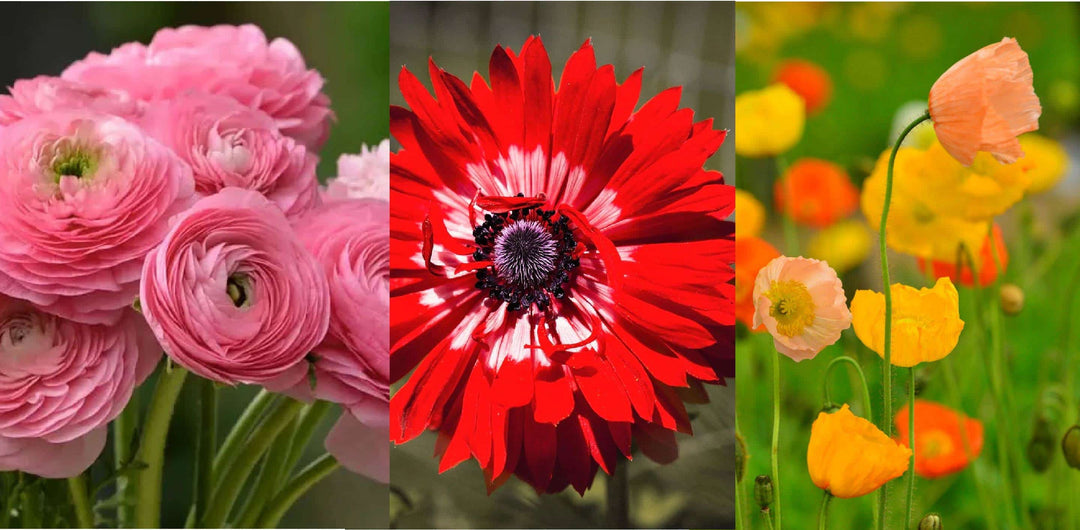2023 December Gardening Tips
Oh no, can you believe it's already December? Time flies! Whether you're an experienced gardener or just starting out, this month can surprise you with its business. Preparing for a successful growing season requires a lot of effort and planning. Not to worry though, in this week's blog, we're here to help by providing a helpful to-do list to keep you occupied throughout December.
-
Winter plant protection is providing frost protection for your plants. This can be done by covering them with materials such as burlap or frost blankets, which act as a barrier against freezing temperatures. Additionally, you can create a microclimate around delicate plants by using protective structures like cold frames or cloches.
-
Grow some popular varieties of indoor forcing bulbs like Paper White Narcissus, Amaryllis, and Prepared Hyacinth! These bulbs typically take around seven weeks to bloom and can bring a touch of nature's beauty indoors.
-
Implement winter mulching techniques: Applying a layer of organic mulch over your soil helps to retain moisture, regulate temperature, and prevent erosion caused by heavy rain or snow.
-
Gently remove the heavy snowfall from branches is crucial as it helps prevent potential damage that can attract pests and disease.
-
When caring for your poinsettia, it's important to keep in mind the "3 M's": moderate bright light, moderate watering, and moderate temperature. Providing just the right amount of these elements will help your plant thrive. Also, be sure to prevent it from being exposed to extreme hot or cold areas.
-
Pay attention to specific needs of different plant species. Some may require pruning or trimming before winter sets in, while others benefit from being moved indoors or into a more sheltered area. Understanding the unique requirements of each plant will help you provide appropriate care during colder months.
-
Cover vulnerable areas; Identify the spots in your garden or landscape that are prone to erosion and protect them with cover crops, straw, or geotextile fabric. These protective layers act as a shield against wind and water erosion.
-
Minimize foot traffic: Reducing foot traffic on your soil during winter is crucial as it can compact the soil particles, making them more susceptible to erosion. Consider using designated paths or walkways to avoid unnecessary damage.
-
Avoid excessive watering; Overwatering can lead to saturated soils that are prone to runoff and erosion. Adjust your watering routine according to weather conditions and only water when necessary.
-
Now is the perfect time to find a beautiful array of spring bulbs! At Wildwood Outdoor Living, you'll discover the widest selection available both online and in-store. Before you visit, take a moment to plan out your garden and ensure that you provide the ideal growing conditions for your chosen bulbs.
-
Practice proper drainage; Ensure that your landscape has proper drainage systems in place to redirect excess water away from vulnerable areas of the soil. This helps minimize the chances of erosive runoff. Remember that taking proactive measures now will help preserve the health of our soils for future generations!
-
To ensure the health and beauty of holly, it's important not to cut it during freezing weather. Doing so can cause the berries to turn black. However, you can still enjoy fresh evergreen boughs indoors by cutting them at any time. If you're looking for long-lasting options, spruce, balsam and cedar boughs are your best choices!
-
Engage in proper shrub maintenance and protect your trees from potential winter damage.
-
If you're planning to set up your tree at the best possible time, the first week of December is an ideal choice. Furthermore, in case you encounter severe winter weather after Christmas, gradually acclimating your tree to the changing conditions will help protect it from any sudden changes and ensure its well-being.
-
To ensure your real Christmas tree brings joy throughout the holiday season, it's important to provide it with proper care. By watering the root ball and spraying the branches with "wilt proof," you can prevent excessive drying and help it stay fresh for five weeks or even longer.
-
Houseplants
a. Provide Sufficient Light; As daylight hours decrease, it's essential to ensure that your houseplants receive adequate light. Place them near windows that get the most sunlight or invest in grow lights to supplement natural light.
b. Adjust Indoor Plant Watering Routine; With lower temperatures and reduced plant growth, it's crucial to adjust your watering routine accordingly. Check the moisture level of the soil before watering and avoid overwatering, as this can lead to root rot.
c. Increase Humidity; Indoor heating systems often cause dry air, which can be detrimental to houseplants. Increase humidity levels by placing a tray filled with water near your plants or use a humidifier.
d. Prune and Propagate; Winter is an excellent time for pruning and propagating houseplants. Trim leggy stems or dead leaves to encourage new growth, and take cuttings from healthy plants to propagate new ones.
e. Rotate Plants; To ensure even growth and prevent one side of the plant from leaning towards the light source, rotate your indoor plants every few weeks.
f. Protect from Drafts; Keep an eye out for drafts near windows or doors as they can damage sensitive plants. Move them away from these areas or provide insulation using curtains or draft stoppers.
g. Monitor Temperature; Different houseplants have varying temperature preferences; make sure you're aware of their specific requirements and keep them within their preferred temperature range.
-
Clear out any debris that may have accumulated in your gutters. By doing so, you are taking proactive steps to maintain the overall well-being of your property.
-
Consider continuing to feed birds throughout the harsh winter months. By providing them with food, you are offering a helping hand during a challenging time when resources are scarce. Your compassion can make a positive difference in their survival and well-being.
-
Keep up the great work with composting! Every little bit you save now will quickly warm up and contribute to a blooming spring. Your efforts are making a positive impact on our environment.









